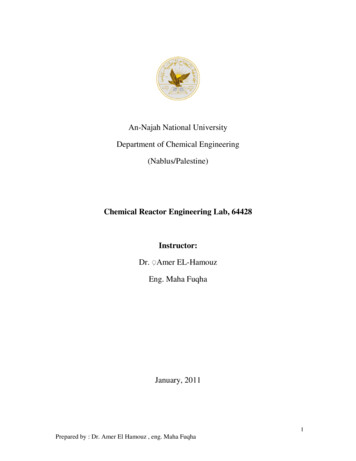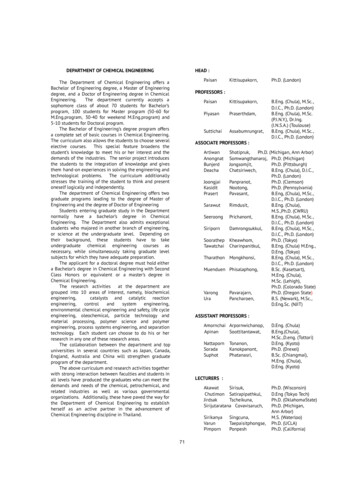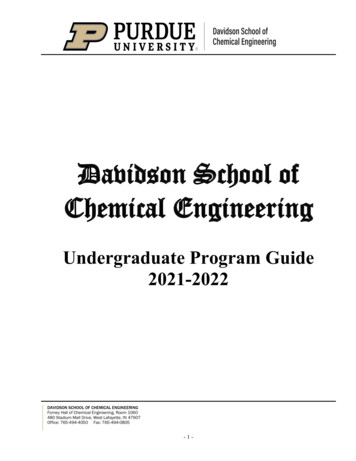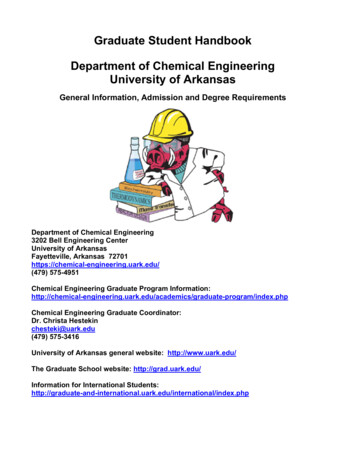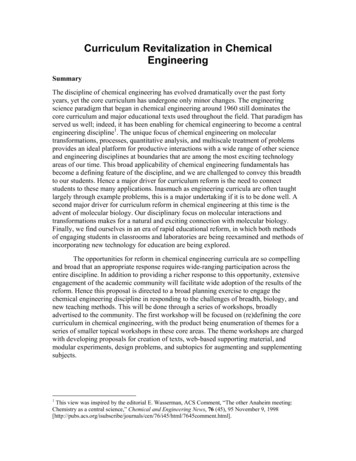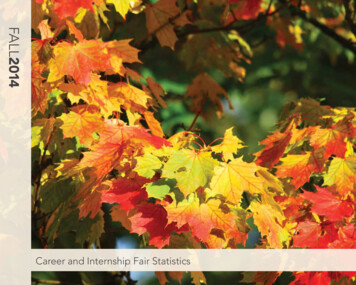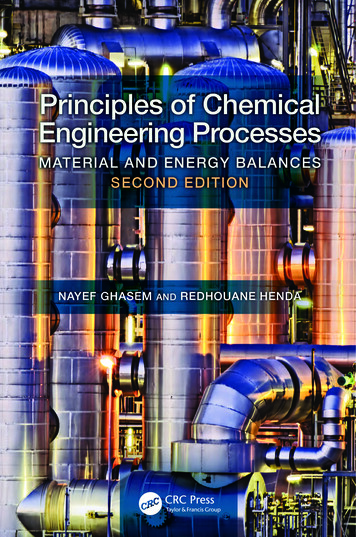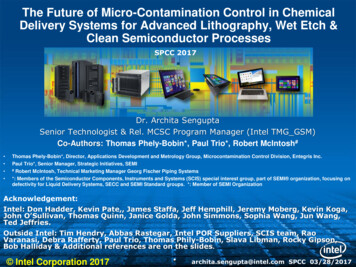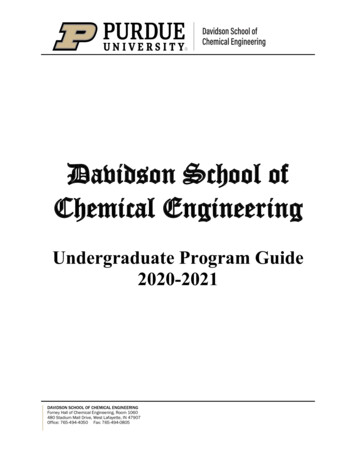
Transcription
Davidson School ofChemical EngineeringUndergraduate Program Guide2020-2021DAVIDSON SCHOOL OF CHEMICAL ENGINEERINGForney Hall of Chemical Engineering, Room 1060480 Stadium Mall Drive, West Lafayette, IN 47907Office: 765-494-4050 Fax: 765-494-0805
Contents. 5Welcome to Chemical Engineering!. 5The Purdue Chemical Engineer . 5CHE UNDERGRADUATE STUDIES STUDENT SERVICES TEAM . 6THE ‘VIRTUAL’ UNDERGRADUATE OFFICE . 7DROP-INS. 7APPOINTMENTS . 7E-MAIL . 7Academic Advising . 8Registration . 8Fall 2020 Registration Expectations . 9BS DEGREE OUTLINE . 10Chemical Engineering Major Core . 10Other Departmental Course Requirements . 10** Chemical Engineering Selective and Engineering Selectives Policy ** . 11A maximum of 6-cr of research (CHE 41100, 41200, 49800, 49900, may apply toward: . 11 Chemical Engineering Selective (3-cr) and Engineering Selective (3-cr) OR . 11 Engineering Selectives (6-cr) . 11Credit may be established in only one course, due to similarity of material content . 11 ABE 58000 or CHE 52500 . 11 CHE 33000 or MSE 23000. 11These courses may not count in the Engineering Selective requirement (as listed in mPP) . 11 ABE 20100, 21000, 30800, 37000 or IE 23000, 33000 or ME 30900 31500 . 11GENERAL EDUCATION UPPER LEVEL SELECTIVES (6-cr) . 11Suggested Pathway of Chemical Engineering Courses . 11DEGREE ENHANCEMENTS . 13-2-
Research. 13Chemical Engineering Research, Internal . 13Chemical Engineering Research, External-Related . 13Minors . 14Concentrations . 14Study Abroad . 14HONORS PROGRAMS . 15Chemical Engineering Distinguished Research . 15* CHE 54000, Transport Phenomena, is highly recommended for graduate program preparation . 15Honors College . 16Contract for Honors Credits . 16ACADEMICS & REGULATIONS . 17Chemical Engineering Course Regulations. 17Academic Policy of Pre- and Co-requisite Courses . 17Pass/No-Pass Option . 18Retake/Repeat of Courses . 18Maximum Credit Limit . 19Course Conflicts . 19CHE Closed Courses . 19Override Requests. 19Auditing Courses . 19Accommodations for Students with Disabilities . 20Exam Accommodations. 20Special Courses . 21CHE Laboratory Courses: CHE 34800, CHE 37700, CHE 37800, CHE 43500 . 21CHE Seminar Courses: CHE 20000, CHE 30000, CHE 40000 . 21Remedial Courses: PHYS 14900, MA 15900, CHM 11100 . 21Research Projects: CHE 41100, CHE 41200 . 21Co-Op Program Courses . 21Co-Op Seminar Courses: CHE 20100, CHE 30100, and CHE 40100 . 21Internship Course: CHE 39699 . 21Graduate Credit. 22SPECIAL REGULATION EXCEPTIONS . 23ChE Course Exception Form . 23ChE Prerequisite Exception Form . 23-3-
ChE General Education Requirement Exception Form. 23ChE Concentration Course Exception Form . 23UNIVERSITY OFFICES . 24Office of the Bursar . 24Office of the Dean of Students . 24University Policy Office . 24Office of the Registrar . 24Student Regulations . 24Student Success Programs . 25Center for Career Opportunities . 25GLOSSARY OF PURDUE ACRONYMS. 26mPPmyPurduePlan . 26FYEFirst Year Engineering . 26T2MTransition to Major . 26CODOChange of Degree Objective . 26CHEChemical Engineering course code . 26UCCUniversity Core Curriculum . 26TRTransfer Credit . 26“P”Pass (on the Pass/No Pass Option) . 26“NP”No Pass (on the Pass/No Pass Option) . 26OFFICES . 26DRCDisability Resource Center . 26OPPOffice of Professional Practice (Co-Op Programs) . 26ISSInternational Student and Scholars . 26ODOSOffice of the Dean of Students. 26-4-
Welcome to Chemical Engineering!The purpose of this guide is to aid our undergraduate students in following registration procedures,academic regulations, and understanding the requirements for the baccalaureate degree in ChemicalEngineering. While this publication does not supersede any statements presented in the PurdueUniversity Catalog, faculty documents, Office of the Dean of Engineering, or Office of the Registrar, ithopefully provides a summary and links to pertinent information in navigating the academic journey atPurdue University.Your Academic Advisor will assist you with registrations, reviewing your academic plan, and fulfillmentof graduation requirements for the BSChE degree. As stated by the University, the final responsibility forcompleting the graduation requirements rests with the individual student. This handbook guide and theSchedule of Classes published each semester should provide adequate information to the student forroutine registration. In addition, students have a personal myPurduePlan (mPP), from which to viewcontinuous progress for all academic pursuits, and a Plan of Study accessed with links to the UniversityCatalog throughout this booklet. The University Regulations Reference Book may be useful for findinginformation regarding the academic calendar, credit transfer, scholastic standing, changing a grade, etc.The Purdue Chemical EngineerChemical Engineers take chemistry and math into the world around us. They are creative problemsolvers who apply scientific knowledge and technical expertise to meet a worldwide demand for usefulmaterials at a reasonable cost and in the safest manner possible. Chemical Engineers are involved increating new medicines, new materials, and new processes that improve the quality of life across theglobe, protect the environment, and conserve our natural resources. They work in research, design,development, production, technical sales, and management. Some are consultants, computer systemdesigners, doctors, or lawyers focusing on patent or environmental law. Chemical Engineers areresponsible for the basic necessities in life that many of us take for granted. Because of the ChemicalEngineer's unique background, Chemical Engineering is one of the broadest fields in the sciencetechnical area. A background in chemical engineering offers a wide variety of career options.The Purdue Chemical Engineering Curriculum builds on the basic sciences and other branches ofengineering. Elective programs developed by the student with his or her advisor can create options insuch areas as applied chemistry, biochemical engineering, biomedical engineering, chemical reactionengineering, chemical processing, energy and natural resources processing, environmental engineering,food processing, geoscience, materials science, nuclear engineering, pharmaceutical engineering, prelaw, pre-medicine, process control, production and sales, and systems engineering.-5-
CHE UNDERGRADUATE STUDIESSTUDENT SERVICES TEAMVirtual OfficeMonday – Friday8:30am – 12:00pm and 1:00 – 4:30pm(765) 494-5650CARYN MORGANSenior Academic Advisorcarynmorgan@purdue.eduKARISSA RADERSTORFAssoc. Director of Undergraduate StudiesAcademic Advisorkraderstorf@purdue.eduDR. DAVID CORTIProfessor of Chemical EngineeringDirector of Undergraduate StudiesDR. GABRIELA NAGYDirector of Industrial EducationFRNY G051SANDY HENDRYXUndergraduate Office SecretarySecretary to Co-Op Coordinatorhendryxs@purdue.eduALLEN R. REIGELSenior Academic Advisorareigel@purdue.edu-6-
THE ‘VIRTUAL’ UNDERGRADUATEOFFICEThe student services office staff is dedicated to working with our undergraduate population with each Advisorand staff member, indicating specific cohorts or related responsibilities to our students: Karissa Raderstorf, Transfers, CODO and T2MCaryn Morgan, Study Abroad LiaisonAllen R. Reigel, Co-Op Program studentsSandy Hendryx, General questions, academic forms, tutorsDr. Gabriela Nagy (FRNY G051), Co-Op Program, Internships, and Instructor of all seminar coursesThe Advisors utilize different communication methods to assist our students in academic advisement. A studentmay connect with their assigned Academic Advisor through:DROP-INSThe first two weeks only of any semester the office operates without appointments to assist students withcourse modification, formwork, or other needs and requests concerning the current term. The Advisors arrange available hours to accommodate their students as well as for duties to fulfill ofother responsibilities, so they may be unavailable at the time of coming in outside of their postedhours. Sandy at the virtual front desk can suggest a time to return based on your Advisor’s schedule.APPOINTMENTSBeginning the third week, and for the remainder of the semester, unless otherwise communicated,students must schedule an appointment with their assigned Advisor. Students schedule appointment viaBoilerConnect (link also in myPurdue) for various reasons such as plan of study, academic issues, etc. During “registration season”, appointments are 15-minutes for audit of registration only If there are other matters to discuss, please set an appointment outside of those indicated datesE-MAILFor convenience and time, students may email their Advisor with general inquiries. These should belimited to questions necessitating short responses to address. Due to volume received, please be concise,and, while Advisors attempt to reply as soon as possible, but please allow 24-48 hours during certaintimes of a semester such as registration (do not expect responses during weekends, breaks or holidays).-7-
Academic Advising“The mission of undergraduate advising at Purdue University is to partner with students, faculty, staff,departments, and administration to empower students to develop and implement an individualized plan foracademic success, and personal and career development, while integrating learning and enrichment within theUniversity and community, as well as assisting students in understanding the nature, purpose, and value ofhigher education.” – Purdue University AdvisingIn the mission of the university, the Davidson School of Chemical Engineering undergraduates are assigned toan Academic Advisor who works with the student through many academic related matters. The Advisor is thestudent’s most utilized front-line resource throughout their education for reasons such as: Questions about the degree program, minors, concentrations, plans of study, etc.Study Abroad and how courses may apply toward degree requirementsPersonal issues interfering with academic performanceAcademic Probation/deficiency issues – poor performance in Chemical Engineering courseworkRegistration (required by the University)Questions about other resources on campusIn that capacity, students in Chemical Engineering can expect their advisor to: Assist with long- and short-term goal setting Discuss personal and academic interests Establish a positive working relationship toprovide a welcoming atmosphere at Purdue Teach how to analyze academic informationand make well-informed choices Educate on various policies and proceduresnecessary to navigate the University Inform student of their responsibilities in theadvising process Refer to campus resources/services as needed Explain degree and major requirements Discuss student’s academic performance Assist with major exploration and interpretingdegree requirements Empower student to advocate for themselves Support personal concerns and academic issues Provide a safe, inclusive environment Provide detailed knowledge and guidanceabout the standards and program(s) they advise Help navigate plan of study and requirements Inform about prerequisites for program coursesStudents are expected to fulfill the following responsibilities in the advising process: Meet Advisor minimally once per semesterand be prepared with courses and questions Review degree requirements and progress Be informed of Purdue and School of ChEacademic policies and procedures Be proactive in your education; seek help atthe first sign of concern! Accept there may be possible struggles insome classes. Work hard and communicate! Know your Academic Advisor Communicate about research, study abroad,experiential learning goals for timely planning Check @purdue.edu email account daily Explore new and challenging opportunities Develop realistic short- and long-termeducational and career goals Familiarize with campus resources, services Notify your advisor of any academicdifficulties or changes in program interestsRegistrationPurdue has a policy restricting students from accessing the registration system until having met their Advisor asrequired by appointment. The Undergraduate Office will send a campaign email through BoilerConnect aboutprocesses setting your appointment. The exception to appointments is reserved only for those students who areoff-campus due to a Co-Op, Internship, or Study Abroad experience and done via email. However, the ChE UG-8-
Office will continue to hold all meetings virtually until further notice to accommodate both those on and offcampus.Fall 2020 Registration ExpectationsIn preparation, students must indicate their course selections on the Course Registration Form (CRF), viaScheduling Assistant. The Advisor will audit the student’s course selections against their myPurduePlan forpositive progress. At the end of the appointment, the Advisor will provide access to the registration system untilNovember 20, 2020. The student is also provided a PIN for system access during open registration dates. Findmore information at Pre-Registration FAQ’s.-9-
BS DEGREE OUTLINEThe degree is comprised of two main fields; Chemical Engineering major and Other Departmental Courses, withthe latter entailing three sub-areas. The official degree plans for each catalog term is on the University Catalog.Degree requirements and total credits for each degree field coincide with student’s listed catalog term.Chemical Engineering Major Core 2018 FALL or PRIOR: 41-cr in the major for students admitted or entered with these catalog terms2019 FALL and AFTER: 46-cr in the major for students admitted or entered with these catalog termso Why a credit variance? The 5-cr difference results from CHE 20000 and CHE 30000 now each 1cr vs. 0-cr (prior to 2019) and addition the Chemical Engineering Selective (3-cr) into theNote: CHE 49700 and 59700 are temporary numbers assigned to newer material offerings and can meetChemical Engineering Selective dependent on the content of the course (i.e. short Study Abroad doesnot)Other Departmental Course RequirementsTo further one’s academic breadth, beyond their major technical study, these requirements provide studentswith a holistic education with a variation of subjects in providing foundational knowledge support for both majorcoursework and future collaboration encounters in industry. These requirements satisfy mandates as set forthby the University (UCC); School of Chemical Engineering; College of Engineering; and ABET.It is important to understand for selective requirements, the approved courses have been identified based onthe content and standard by the faculty, without regard to frequency offered. While these lists include activecourses, not all are available in a given semester, so always reference “Look Up Classes” for offerings.FYE: First-Year Engineering CoreMUST be successfully completed for T2M and CODO review. CODO’s may be admitted without ENGR13100/13200 coursework completed due to ineligibility to enroll previously as a non-FYE student.Chemical Engineering STEM Core (36-credits) The STEM Core is necessary supplemental coursework for Chemical Engineering understanding.Selective option courses must be from the provided approved linked list to satisfy that requirement.Biology Selective (3-cr)CHM 26100 (3-cr), Organic Chemistry ICHM 26300 (1-cr), Organic Chemistry Laboratory I (registered separately)CHM 26200 (3-cr), Organic Chemistry IICHM 26400 (1-cr), Organic Chemistry Laboratory II (registered separately)CHM 37000 (3-cr), Physical Chemistry- 10 -
**Engineering Selectives (6-cr) See notes below**MA 26100 (4-cr), Multivariate CalculusMath Selectives: Linear Algebra and Differential Equations; there are seven available track optionsMA 26500 (3-cr), MA 26600 (3-cr) the Department of Mathematics recommends this sequenceA variation of accumulated credits is possible dependent on the track opted to followPHYS 24100 (3-cr), Electricity & OpticsTechnical Selective (3-cr)** Chemical Engineering Selective and Engineering Selectives Policy **A maximum of 6-cr of research (CHE 41100, 41200, 49800, 49900, may apply toward: Chemical Engineering Selective (3-cr) and Engineering Selective (3-cr) OR Engineering Selectives (6-cr)Credit may be established in only one course, due to similarity of material content ABE 58000 or CHE 52500 CHE 33000 or MSE 23000These courses may not count in the Engineering Selective requirement (as listed in mPP) ABE 20100, 21000, 30800, 37000 or IE 23000, 33000 or ME 30900 31500General Education Selectives (18-credits)As a longtime degree staple supporting of general education coursework, this field overlaps with requirementsinstituted in the University Core Curriculum (UCC); BSS, HUM, and STS (3-cr each). These are required of allundergraduates to ensure achieving common academic and foundational goals and must come from theapproved UCC course lists. Additionally, there are General Education and General Education Upper Levelrequirements (9-cr total), from the ChE approved list, satisfying a diverse education as directed by ABET. Behavioral Social Science (BSS)Humanities (HUM)Science, Technology & Society (STS) General Education Selective (3-cr)Gen Ed Upper Level Selectives (6-cr)GENERAL EDUCATION UPPER LEVEL SELECTIVES (6-cr)As of Fall 2019, to ensure cohesiveness and consistency, students must select courses from this approved listto satisfy the intended degree requirement. The list has been expanded to also include courses from thedepartments of CSR, ENTR, MGMT, OBHR, TLI (for those which follow the requirement definition), as well asindividual options of NUTR 30300 and FS 47000 for a range in choice availabilities.What defines a General Education Upper Level course?A course having a listed prerequisite of the same subject (i.e. PSY 20000; PSY 12000 prereq) or is listed as30000-level and higher, which may or may not have a prerequisite (i.e. HIST 35100).Are there possible exceptions for the requirement?If a course appears to have relevant foundational content, but is not on the list, the student may submit thecourse syllabus and exception form through their Advisor for review by the Undergraduate Committee.Suggested Pathway of Chemical Engineering CoursesThis is considered the critical CHE course path, and, due to the layout of prerequisites and offerings, studentsshould follow this outline, post-successful completion of First Year Engineering (FYE) in one academic year, to- 11 -
graduate in the four-year timeline. CHE 20500 should be successfully completed by fall term of the 2nd year toavoid a heavy course load in the third-year Spring and fourth-year Fall terms. Deviating from this pathway, ornot meeting course grade requirements, may result in an additional year to graduate.FALLCHE 20000CHE 20500FALLCHE 30600CHE 37700FALLCHE 40000CHE 42000CHE 43500CHE 456002nd YearSPRING2nd Year(Fall only) CHE 21100CHE 32000rd3 YearSPRING3rd YearCHE 30000(Spring only)CHE 34800CHE 37800th4 YearSPRING4th Year(Fall only) CHE 45000(Fall only) CHE Selective(Fall only)CHE 20500 Enrollment & CODO and Transfer Students* ENGR 13100 (prerequisite) must be successfully completed prior to CHE 20500 enrollment* CHE 20500 may be taken concurrently with ENGR 13200, a FYE Core and degree requirement* CHE 20500 is offered Fall and Spring semesters and Summer sessions- 12 -
DEGREE ENHANCEMENTSWhile the curriculum set forth is challenging and provides a strong foundation in the area of ChemicalEngineering, in preparation to be productive and an asset in the industry, many students seek additionalopportunities to integrate enhancements based on interests or career choice. Listed are ways for students toachieve enrichments within an academic setting along with, or as a substitute, to Co-Op or internship avenues.ResearchWhile research is not required for the degree, it is often pursued for selective degree requirements, and a facetof education bridging theory with application of knowledge from coursework into simulation of “real world”aspects while working closely with a faculty mentor. The School of Chemical Engineering has options forresearch and innovation allowing students to capitalize on experience and earn degree credit while expandingtheir perspective, application into products in Chemical Engineering, and enhancing their reporting andcommunication skill sets in preparation for industry and achieving the expectations of our graduates. Theseopportunities are highly recommended for those students seeking continued education of Masters and PhD.Chemical Engineering Research, InternalMany School of Chemical Engineering faculty are involved in research for discovery and impact to enhancecontributions to their classroom and labs, industry and world communities. With these objectives, often facultyhave opportunities for undergraduate students to pursue and combine their academics to application ofeveryday needs addressed by industry through experiential learning.How to Register: In a professional manner, the student approaches the faculty with whom they wish to workbased on the project or relation of their area of interest. Both parties must agree on involvement (hours/week;meeting fr
The Purdue Chemical Engineering Curriculum builds on the basic sciences and other branches of engineering. Elective programs developed by the student with his or her advisor can create options in such areas as applied chemistry, biochemical engineering, biomedical engineering, chemical reaction
